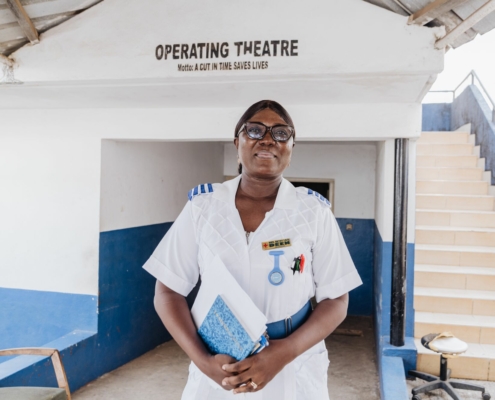Boy, six, can return to school with twin brother after his bowed legs are repaired
A six-year-old boy who developed severely bowed legs, when his twin brother did not, has been able to go to school after a surgical charity repaired them.
Serigne’s legs started to bow when he was a toddler, while his twin Fallou’s remained straight.
When he was two years old, his parents noticed he took longer to walk, and when he did, he struggled.
His mother Seye said: “As he was growing, we noticed that his legs were slowly opening. At that moment, we knew what was blocking his progress.”
They feared the physical and social limitations he would face would affect his confidence. “His legs would ache when he was playing and running, he was different from other children,” she added.
It became so bad; he was forced to quit school soon after he started. Being a twin made this especially difficult for Serigne, who watched his brother Fallou go to school and he grew discouraged.
His parents, who are farmers, began to seek help from local hospitals as soon as his legs started to bow. But once they were told how much surgery would cost to rectify it, they knew they would never be able to afford it.
There are currently no known fully qualified pediatric orthopedic surgeons in his home nation of Senegal and yet around half the nation’s population are children— and one third of those are under five years of age.
When his parents heard that Serigne might be eligible to receive safe, free surgery with Mercy Ships, they immediately took him for screening. He qualified for surgery, and he and his mother traveled to Dakar to board the organization’s newest hospital ship, the Global Mercy™.
Serigne’s life-changing surgery took four hours. It involved breaking his fibia in order to correct the tibia.

Volunteer orthopedic surgeon Dr. Johannes Kolbe from Germany was part of the team performing Serigne’s surgery and said the condition was likely caused by a mixture of malnutrition and poor bone quality. Dr. Kolbe said the surgery would have a profound impact on his life.
He said, “We can expect that he can walk, and he can learn, and he can go to school.”
While the surgery was relatively swift, Serigne’s path to full recovery involved weeks of dedicated rehabilitation. He was then in casts for six weeks before the casts were removed and he had to painstakingly learn to walk again, firstly with the aid of a walker.
During this time, nurse volunteer and ward leader, Ansley Burnett from America observed: “He is itching to walk. In fact, he keeps telling the nurses that he wants to walk.”
He was determined. Much to the delight of patients and hospital crew, he faced his journey with an ever-present smile and contagious laughter that echoed through the hospital halls.
Even before his surgery his mother said, “He is such a happy boy, he is a fighter. He has a strong spirit!”
They put that partly down to the name they chose for him which embodies leadership and a potential for greatness in the region he lives in, Louga, in northwest Senegal.
His father, Abdou, says he deliberately chose the name because he foresaw a future of influence for his son.
“I wanted to give him this name because when you believe someone is going to be great, you name them Serigne,” he explains.
At his tender age, Serigne already embodies the essence of leadership that his name implies. His parents started seeing his determined spirit early in life.
His father said, “Since he started talking, if he wants something, he won’t hesitate to tell you. God gave him this leadership spirit; he was born with it, and he [Serigne] shares everything with everyone.”
After Serigne’s homecoming, Abdou said, “He went to the ship with pain, but he returned home with great joy.”
Serigne, bursting with excitement, immediately wanted to show off his transformation to his friends. Despite his parents’ gentle pleas, he insisted on walking to all their neighbors’ houses.
Abou said: “There was a time I could not really sleep because of his legs… If my level of anxiety was at 100%, I can say that it’s on 5% now. His legs have been fixed, so going to school isn’t going to be so bad.”
Addressing 300 surgeons from Africa and Europe at the joint Third Congress of the Senegalese Society of Pediatric Surgery and the Ninth Congress of the African Society of Pediatric Surgery in Dakar last month, the Secretary General of the Ministry of Health and Social Action Professor Habib Ndiaye Habib Ndiaye praised Mercy Ships’ partnership in helping the country tackle its high demand for surgical needs.
He said: “In terms of partnerships, I would like to highlight the considerable contribution made by the Mercy Ships program in meeting the very high demand with regards to orthopedic surgery.”
Mercy Ships needs many more volunteers to support partnerships with African nations and improve the infrastructure of surgical services to transform more lives like Serigne’s. To find out more about volunteering on our two hospital ships, visit Volunteer Opportunities (mercyships.org)








